Quranic Verses
- Sura An-nisaa’ (4), Verse 70/71.
- Sura Al-a`raaf (7), Verse 35/36.
- Sura Aali-`imraan (3), Verse 81/82 and Sura Al-aHzab (33), Verse 7/8.
Opinion of Muslim Scholars
Hazrat Sheikh Ahmad Farooqi
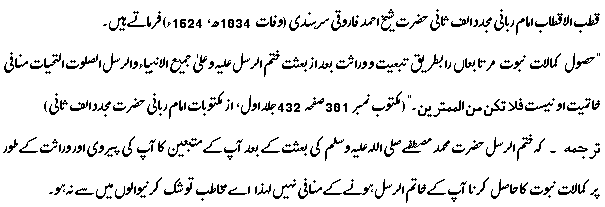
‘The rising of prophets after the Khatamar Rasul Hazrat Muhammad, the Chosen One, peace and blessings be upon him, from among his own followers and as a heritage, does not in any way run counter to his status as the Khatamar rasul. Therefore, O reader, do not be among those who doubt.’ (Maktubat Imam Rabbani, Hazrat Mujaddid Alf Thani)
Hazrat Imam Mohiyyiud Din ibni Arabi

‘From the study and contemplation of the Darud we have arrived at the definite conclusion that there shall, from among the Muslims, certainly be persons whose status, in the matter of prophethood, shall advance to the level of prophets, if Allah pleases. But they shall not be given any book of law.’ (Fatuhati Makiyyah: Vol 1. pg 545)

Hazrat Imam Abu Ja’far Sadiq
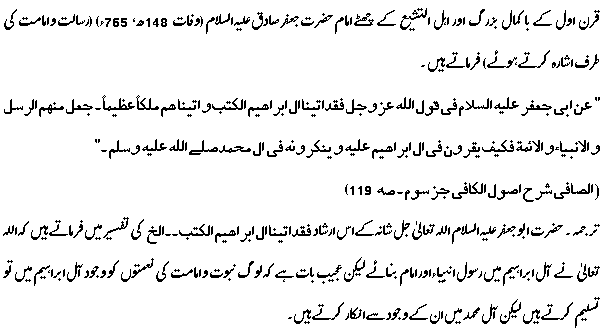
‘Hazrat Abu Ja’far, while discussing the Quranic verse: “For verily We granted the Book to the children of Abraham…,” said that God vouchsafed to the children of Abraham, Messengers, Prophets and Imams. But what is ironical is that people believe in what God blessed the children of Abraham with and yet they deny this blessing for the progeny of Muhammad.’ (Al-Saafi Sharah Asool Al-Kaafi, Part 3, Pg. 119)
Hazrat Imam Abdul Wahhab She’raani

…prophethood has not been abolished and it is only law-bearing prophethood that is abolished. (Al Yawaaqeetu Wal Jawaahir: Vol. 3 pg. 35)
Allama Qummi (Shia Scholar)
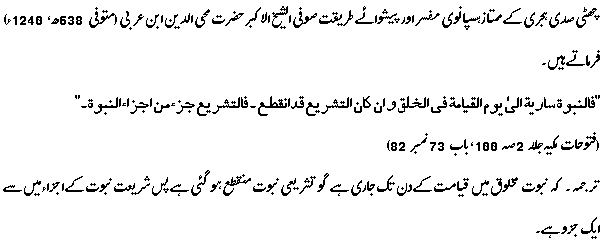
Hazrat Shah Wali Ullah
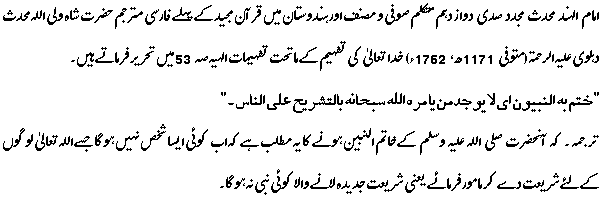
The Muhaddith of Dehli, Hazrat Shah Wali Ullah subscribed to this opinion and stated:
‘The meaning of the Holy Prophet being the Khataman Nabiyeen is that there shall not now appear a person whom God may appoint with a new Law for mankind, that is to say, there shall be no prophet who shall come with a new Law.’ (Tafheemati Ilahiyyah pg. 53)

The Hakim ul Millat in fact gave credence to the opinion that prophets within the Ummah may arise when he stated:
‘There cannot be an independent prophet after the Holy Prophet, peace and blessings of Allah be upon him, who is not his follower and his adherent.’ (Al Khairul Katheer: pg 111)
Sheikh Abdul Qadir Al-Kurdustani

Hazrat Maulana Abul Hasanat Abul Hayee

Hazrat Maulana Abul Hasanat Abul Hayee, a distinguished scholar of the Sunni sect shared this opinion and stated:
‘After the demise of the Holy Prophet, peace and blessings of Allah be upon him, or even during his own lifetime, it is not an impossibility for someone to be exalted to the position of a simple prophet. But a prophet with a new Law is, indeed, forbidden.’ (Dafe ul Waswas: pg 16)
Hazrat Mazhar Jan Janan Naqshabandi

‘No perfection, except the perfection of prophethood bearing Law has ended. With respect to the other beneficences of God Almighty, He is neither miserly nor niggardly.’ (Maqamati Mazhari: pg 88)
Hazrat Sayyed Abdul Karim Jilani
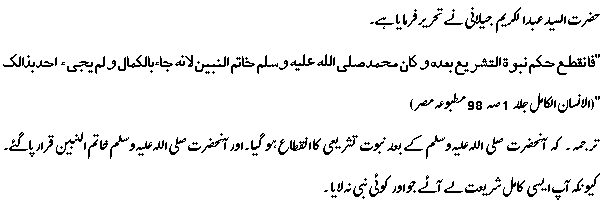
Hazrat Sayyed Abdul Karim Jilani, the renowned mystic of the 8th century Hijra was of the opinion that:
‘The coming of the Law bearing prophets, after the Holy Prophet, peace and blessings on him, has ceased as he has been exalted to be the Khataman Nabiyeen because he brought with him such a perfect law as no other prophet had brought before him.’ (Al Insanul Kamil: Vol 1. Ch 36. Pg 68)
Hazrat Sheikh Baali Afandi

Hazrat Maulana Abdul Hayee Faranghi Mahal

Hazrat Maulana Faranghi Mahal, an eminent scholar of the Ahle Sunnat also discussed the significance of the expression Khatamae Nubuwwat and on behalf of the Sunni Scholars, he declared:
‘The divines of the Sunni sects believe in and expound the fact that in the course of the Ministry of the Holy Prophet, peace and blessings of Allah be upon him, there cannot appear a law bearing prophet and his prophethood extends to the end of days. A prophet who appears during his ministry shall necessarily be the follower of the Law of Muhammad.’ (Majmu’ah Fatawa: Vol. 1, pg 144)
Hazrat Maulana Jalal-ud-Din Room

The great saint, Hazrat Maulana Room (Rehmatullah Alaihi) writes:
“Make such plans to perform righteousness in the way of God that you attain prophethood within the Ummat (religious community)” (Mathnavi Maulana Room, Daftar I, pg. 53)